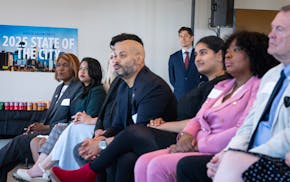Opinion editor's note: Editorials represent the opinions of the Minnesota Star Tribune Editorial Board, which operates independently from the newsroom.
•••
In one sense, the next four years are always beginning as we speak. It's a revolving time frame that invites prediction but is bound to defy it. Yet, at regular intervals in America, the transition to "the next four years" has a definite demarcation, with pomp and circumstance and, sometimes, a decisive swerve in direction. The return of President Donald Trump on Monday was one such time. Here are thoughts about the Inauguration Day's events from members of the Minnesota Star Tribune Editorial Board.
•••
The peaceful transition of power is an awesome thing to witness. In such a moment, a person wants to be positive for the future. Wants to hope new policies will be fruitful even if the approach seems disagreeable, and even if what's presented as "common sense" defies common wisdom.
The frigid weather in Washington on Monday (frigid for Washington) forced the second presidential inauguration of Donald Trump — a "man's man," according to a supporter — inside to the Capitol Rotunda, which had the benefit of bringing the nation Trump's indoor voice.
Trump actually is skilled at vocal modulation, and it makes him seem reasonable. Yet he's unchanged. His address was filled with the same straw men and hyperbole, the same self-reverence, the same overt and sly enmity toward domestic unity, and the same us-against-the-world mentality.
Because Trump speaks mostly about his intentions and little about the execution thereof, people lap this up.
Certainly the nation has improvements to embark upon, and Trump's accrual of 49.8% of the popular vote in an Electoral College win gives him the authority to try things his way. Therein lies the hope.
But one also hopes Americans remember that anything worth doing is worth doing right.
DAVID BANKS, assistant commentary editor
•••
During Trump's first presidency, those who follow policy closely saw an administration a bit uncertain, especially in the first year, about how to work the levers of power now in its control.
That won't be the case during Trump's second presidency. On Monday, in a speech characterized by his unique mix of bombast, victimhood and shopworn phrases ("like never before"), Trump made clear that his team is ready to roll this time. There was a long laundry list of unsurprising priorities: policies that elevate fossil fuels over renewables, tariffs, deploying the military to the nation's southern border and restoring law and order, particularly in cities. Oh, yes, and the Gulf of Mexico will get a new moniker.
Deeper in his speech was a quiet but jolting reference to expanding U.S. territory as part of the recipe to make America great again. That's likely a reference to Trump's interest in Greenland or the Panama Canal, but it could mean anything. It certainly bears watching. Do modern American values include expansionism? Guess we'll find our comfort level with that.
As of Monday, America has entered a new "golden age," Trump vowed. This time, he's brought a detailed road map with him as he returns to the White House and is emboldened by his win in November. This administration is hitting the ground running, for better or worse.
JILL BURCUM, editorial writer and columnist
•••
One thing instantly stands out about Trump's second inaugural address: the tone. It wasn't as dark as the "carnage" inauguration rhetoric Trump summoned in 2017. Still, it was dark enough. There is no mistaking the extreme changes coming.
Trump made no effort to resist the opportunity to gloat or to suggest that his accession is divinely inspired. It's fitting that the federal holiday honoring the birthday of the Rev. Martin Luther King Jr. was commemorated by multiple large-scale ceremonial breakfasts across the nation today. The holiday serves as a timeless reminder of the unity required to keep a sweepingly diverse nation intact.
Perhaps not to be outdone, Trump's inauguration ceremony offered its own finely choreographed tribute to King. In a closing benediction, the Rev. Lorenzo Sewell, a young pastor from Detroit, included a soaring passage from King's famous "I have a dream" speech. It was finely choreographed theater for an audience, many of whom stand in opposition to King's vision. But Sewell nailed the prayer with appropriated rhetoric of King.
Trump is the greatest showman ever to occupy the office of president. Now we bear witness to the second coming.
PHIL MORRIS, opinion editor
•••
It wasn't just the inauguration of America's 47th president but also of its 47th commander in chief, the most profound presidential role. So, what was — and wasn't — said about defense and foreign policy resonates globally.
"As commander in chief, I have no higher responsibility than to defend our country from threats and invasions," Trump rightfully said. But Russia, Iran and North Korea, which along with China make up an ad hoc axis of authoritarianism striving to upend Western-led order, were not mentioned. And the scant focus on China was in the context of the president's provocative comments on the Panama Canal, of which he said, "We're taking it back."
The international interpretation of that stark statement, as well as the phrase that the U.S. will be a country that "expands our territory," will vary. But along with his recent rhetoric on Mexico, Canada and Greenland, it suggests a sphere-of-influence, Western-Hemispheric focus.
That message may be welcome in Moscow and Beijing, where regimes claim Ukraine and Taiwan, respectively. But the unique advantage Washington enjoys in resisting regional hegemony — its extensive network of European, Asian and, yes, Western Hemispheric allies — weren't acknowledged. Regardless, Trump, who promised that his "proudest legacy will be that of a peacemaker and unifier," will need the alliances his predecessor solidified.
JOHN RASH, editorial writer and columnist
•••
After being sworn in on Monday, Trump talked about freedom and liberation several times — even going so far as to say that for "American citizens, January 20th, 2025 is Liberation Day." He returned to that theme as he acknowledged that his inauguration fell on the same day as the national Martin Luther King holiday, commemorating the late civil rights leader who also included "freedom" and "liberty" in many of his speeches.
Though both used those words, the meaning behind them were decidedly different.
Trump said that America's education system "teaches our children to be ashamed of themselves, in many cases to hate our country." So does that mean schools should have the "freedom" to eliminate the truth about some aspects of American history in our classrooms? To be "liberated" from even talking about the racial aspects of what led to the deaths of Philando Castile, George Floyd, Breonna Taylor and other Black people at the hands of police?
The newly inaugurated president said that in honor of King Day "we will strive together to make his dream a reality." Yet I don't believe that King's dream involved pulling back on efforts to improve race and gender discussions and relations — especially when there is still evidence of unequal treatment. Trump said Monday that he would "end the government policy of trying to socially engineer race and gender into every aspect of public and private life."
In a powerful MLK breakfast speech, nationally known journalist and Minneapolis native Michele Norris wisely said the inauguration and the King holiday should be a call to action to preserve, expand and fight for freedoms that King stood for.
DENISE JOHNSON, editorial writer and columnist

Rash: At home, Jake Sullivan reflects on events abroad

Opinion: Let's not lose sight of what's best for older adults

Readers Write: Minneapolis politics, Trump's budget, hot tub rentals
